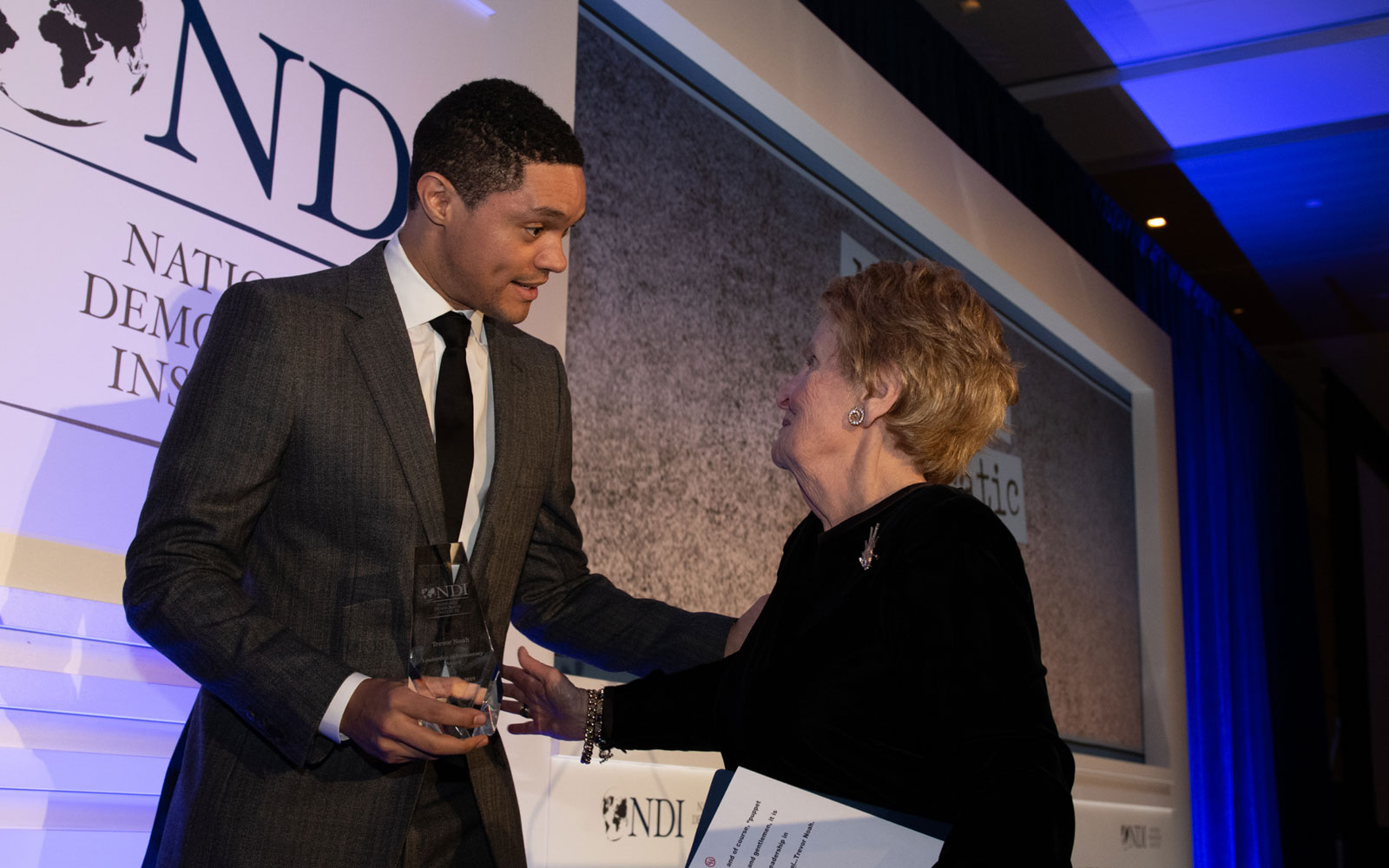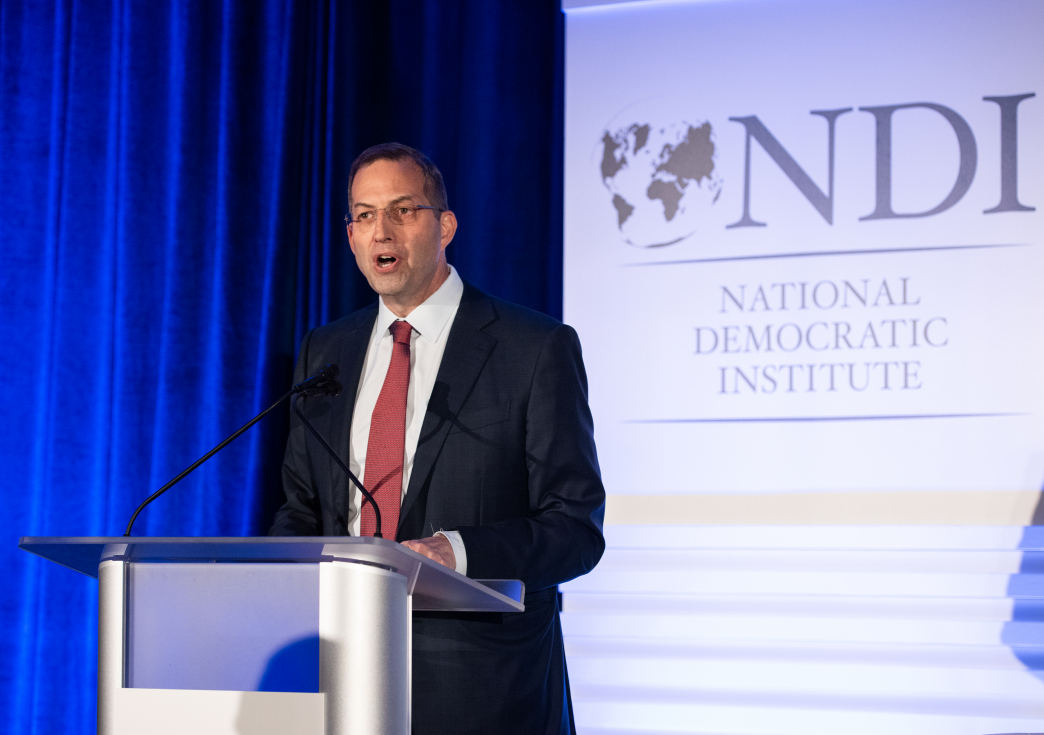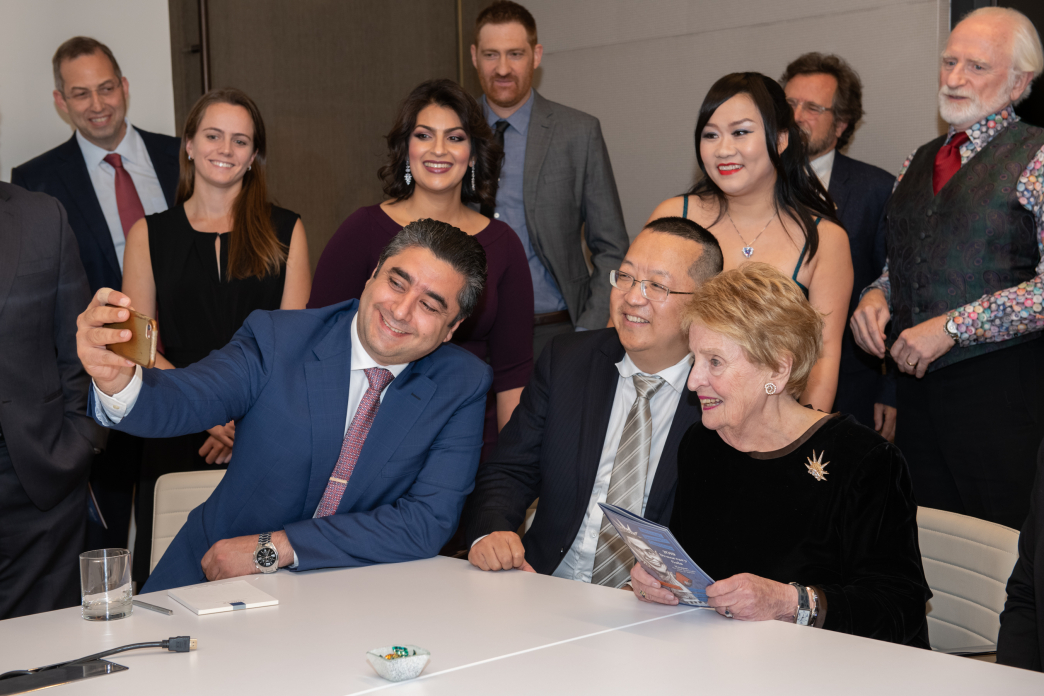
Trevor Noah, host of The Daily Show, accepts the Leadership in Democracy Award from NDI Chairman Madeleine K. Albright. Albright recognized Noah for his global contributions to “exploring the world's injustices and follies with just the right combination of wit and wits.”
SHARE
ISSUES
On October 22nd, 2019, the National Democratic Institute awarded comedian Trevor Noah with the Leadership in Democracy Award at NDI's annual Democracy Gala. With a focus on honoring the role humor plays in democracy, the dinner brought together over 460 democracy activists, members of Congress, labor and non-profit organizations, corporate supporters and members of the administration to celebrate humor as a vital form of free speech. The full video of the evening features NDI Chairman Madeleine Albright, Trevor Noah and a cartoonists panel describing the many ways democracy helps humor.
“The ability to laugh at a leader who doesn’t want to be laughed at is one of the core pillars of freedom,” said Noah in his acceptance speech. "When you can laugh at somebody in power it reminds them that they, like you, are still a human being who is accountable to other human beings."
In presenting Noah with the award, Albright called Noah “one of the world's most intelligent and incisive satirists … exploring the world's injustices and follies with just the right combination of wit and wits.”
“Humor has been used to tell inconvenient truths in ways that unmask the arrogant and corrupt and enable us to see our own opportunities and responsibilities in a fresh light.”
Albright added, “Democracy depends on people who have the courage to speak up, join together and fight back injustice.” Trevor Noah is one of those people.
Derek Mitchell addressing dinner

“I have long felt a connection between humor and democracy. At the core of humor is a freedom of spirit ... humor is perhaps the most democratic form of speech,” NDI President Derek Mitchell told the crowd. “We come together for a single purpose -- to promote and share the promise of democracy, and ensure that promise remains alive for everyone equally everywhere.”
With programs in over seventy countries, NDI is committed to supporting freedom of expression and the right of all citizens to participate fully in democracy, be it via the ballot box or via laughter.
In addition to Noah’s keynote award acceptance speech, Politico’s Matt Wuerker led a panel of political cartoonists from around the world, including Venezuelan cartoonist Rayma Suprani, exiled Chinese cartoonist Liming Wang and Kevin Kallaugh of The Economist.
“Political cartoonists are often the canaries in the coal mine when it comes to freedom of speech,” said Wuerker. “Tolerance of political satire is a hallmark of democracy and open societies.”
Liming Wang, who works in exile under the pen name Rebel Pepper, noted of his native China, “The communist party has no sense of humor at all.”
“I think humor is something that touches everything, and it's a reflection of what is happening in society,” said Rayma Suprani, who lost her job for a cartoon mocking then-president of Venezuela Hugo Chavez.
Mexican comedian Chumel Torres also took the stage to underscore humor’s ability to keep political leaders honest.
19072R-22.jpg

“We need humor. We need satire,” said Torres. “Because it’s the only way we can get rid of bullies -- and there are a lot of bullies.”
Iraqi comedian Hussam Hadi also spoke and highlighted humors role in Iraq’s young democracy.
After hearing this international group of cartoonists and comedians, Albright said, “I couldn't be happier to be appearing alongside all of these men and women. They are talented, they are fearless, and they are seriously funny.”
As the evening drew to a close, Noah said, “Let us continue to fight for freedoms around the world, let us continue to uplift those who do not have voices, let us fight to be progressive, let us move marginalized voices forward using comedy, using any freedom of speech that we are allowed."
The National Democratic Institute would like to thank all of our local partners, donors, board members, leadership and staff who have played such a vital role in fulfilling our mission to work for democracy and make democracy work.
“We are, as always, extraordinarily grateful for the support and partnership provided by our parent organization, the National Endowment for Democracy, as well as our friends and partners from the U.S. Agency for International Development, and the State Department’s Bureau of Democracy, Human Rights, and Labor,” said Mitchell.


